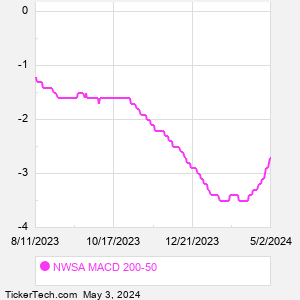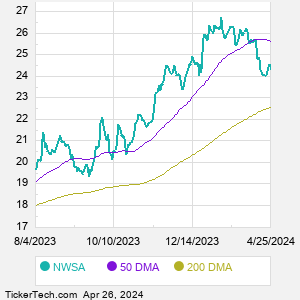News is a media and information services company focused on creating and distributing content and other products and services to consumers and businesses. Co. comprises businesses across a range of media, including digital real estate services, subscription video services in Australia, news and information services and book publishing, that are distributed under various brands, including The Wall Street Journal, Barron's, Dow Jones, The Australian, Herald Sun, The Sun, The Times, HarperCollins Publishers, Foxtel, FOX SPORTS Australia, realestate.com.au, Realtor.com®, talkSPORT, and OPIS, among others. Co. distributes its content and products and services to consumers.
When researching a stock like News Corp, many investors are the most familiar with Fundamental Analysis — looking at a company's balance sheet, earnings, revenues, and what's happening in that company's underlying business. Investors who use Fundamental Analysis to identify good stocks to buy or sell can also benefit from NWSA Technical Analysis to help find a good entry or exit point. Technical Analysis is blind to the fundamentals and looks only at the trading data for NWSA stock — the real life supply and demand for the stock over time — and examines that data in different ways. One of those ways is to calculate a Simpe Moving Average ("SMA") by looking back a certain number of days. One of the most popular "longer look-backs" is the NWSA 200 day moving average ("NWSA 200 DMA"), while one of the most popular "shorter look-backs" is the NWSA 50 day moving average ("NWSA 50 DMA"). A chart showing both of these popular moving averages is shown on this page for News Corp. Comparing two moving averages against each other can be a useful visualization tool: by calculating the difference between the NWSA 200 DMA and the NWSA 50 DMA, we get a moving average convergence divergence indicator ("NWSA MACD"). The NWSA MACD chart, in conjunction with the chart of the moving averages, basically helps in visualizing how the moving averages are showing convergence (moving closer together), or divergence (moving farther apart). |



